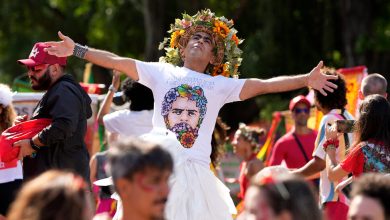Latin America’s ‘Green Wave’ Offers Lessons for U.S. Abortion Advocates

BOGOTÁ, Colombia — For decades abortion rights activists in Latin America looked to our counterparts in the global north to learn the best litigation and advocacy tools. We considered the incremental gains made in the years leading up to Roe v. Wade in the United States a blueprint for victory in our fight.
But as a feminist green wave, referring to the green bandannas abortion rights supporters wear, sweeps across the region, this summer the United States Supreme Court could roll back abortion rights. Inspiration is now coming from the south rather than the north, thanks to the coordinated efforts of many Latin American activists.
Colombia had a blanket ban on abortion until 2006, when the country’s constitutional court mandated that abortion be legally accessible when a woman’s health and life were at risk, a fetus had serious health problems or when a pregnancy resulted from rape. But some women faced barriers to accessing these legal abortion services, including onerous medical requirements to prove they qualify. Others who had abortions — or who helped a woman obtain one — could be sentenced to up to five years in prison.
Last September, a lawsuit asking the Constitutional Court of Colombia to decriminalize abortion was filed by the Causa Justa — or Just Cause — movement, a coalition of which the Center for Reproductive Rights is a part. We argued that abortion is essential health care that should not be regulated in the penal system. The court also asked Congress to create regulations to apply the ruling. In a transformative shift for the majority-Catholic country, we are now the third country in Latin America to decriminalize abortion in the last year, behind Mexico and Argentina.
The landmark ruling was issued as my colleagues in the United States are defending the right to abortion in a case that could overturn a half-century of reproductive rights. My colleagues in Europe joined in filing amicus briefs in cases before the European Court of Human Rights highlighting the harms of Polands’s near-total abortion ban. A decade ago, few could have imagined that Latin America, which is home to some of the most restrictive abortion laws in the world, would become a benchmark for advances in sexual and reproductive rights.
Women across the globe are connected by our shared struggle to overcome the discrimination we experience simply because of our gender. The hard-fought gains in Latin America are the result of decades of organizing, mobilizing, working to shift the conversation around abortion and, most importantly, working together to bring about change.
In Colombia, Causa Justa filed a lawsuit signed by the Center for Reproductive Rights, La Mesa por La Vida y La Salud de las Mujeres, Women’s Link Worldwide, Católicas por el Derecho a Decidir and Grupo Médico por el Derecho a Decidir on behalf of 90 other organizations and more than 130 activists. Teamwork is just one of the strategies that buttressed the fight for our fundamental rights, with feminists across the region tailoring their approach to adapt to local challenges.
But it wasn’t enough to change our laws. How people thought and talked about abortion had to evolve, too. The movement sought to socially decriminalize abortion. We fought diligently to destigmatize and combat misinformation about abortion. We took to the streets and social media with our messages. Advocates and celebrities came out on social media and in public events to support a woman’s right to choose. In one video, artists, actors, activists and even religious leaders explained that women who seek abortion cut across social, political and religious lines.
Having local organizations take the lead was crucial. In Colombia, we wanted to understand what obstacles women faced in accessing abortion, and who was criminalized. Mesa por la Vida y la Salud de las Mujeres, an organization that’s part of the Causa Justa Movement, fanned out across the country to talk to women and document what was happening.
Researchers found that the majority of women who faced legal consequences for having an abortion or for helping someone get one were low-income and lived in rural and remote areas. They also found that women living in those areas were more likely to have complications from unsafe abortions. Not only was this information critical to the lawsuit — it was also critical to changing the conversation about abortion in Colombia.
Our fight is far from over. In countries like El Salvador and Honduras, abortion is still prohibited in all circumstances and penalized. Colombian activists remain united to ensure that the decision of the court is implemented. But as some of the largest countries in the region take a more progressive stance on reproductive rights, there is reason to be optimistic.
If the United States Supreme Court rolls back the constitutional protection of abortion this year, the move would reverberate around the world. Latin American women will continue building knowledge and working across borders in the fight to guarantee everyone’s rights. Perhaps our approach can be useful to our sisters in the global north, to which we have looked for so many years for lessons.
Catalina Martínez Coral (@catamartinezc) is the senior regional director of the Center for Reproductive Rights in Latin America and the Caribbean.
The Times is committed to publishing a diversity of letters to the editor. We’d like to hear what you think about this or any of our articles. Here are some tips. And here’s our email: [email protected].
Follow The New York Times Opinion section on Facebook, Twitter (@NYTopinion) and Instagram.





